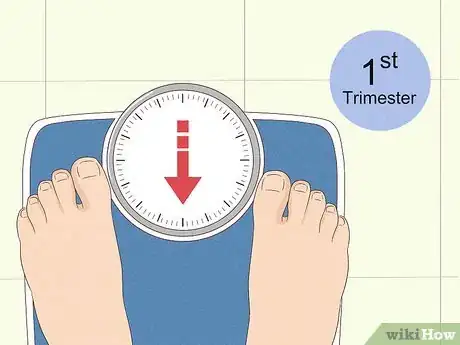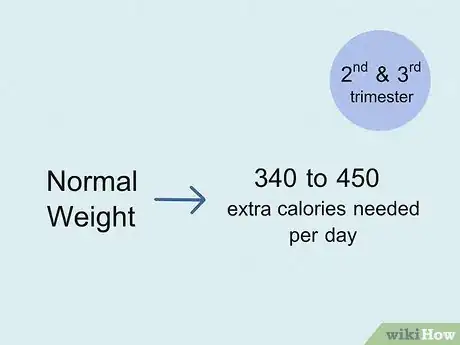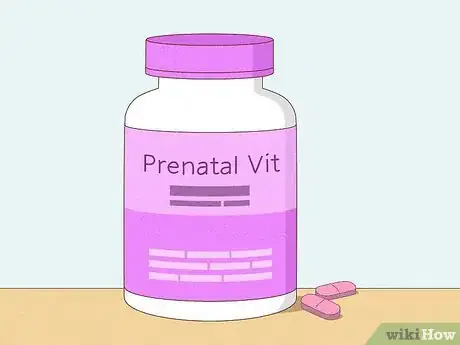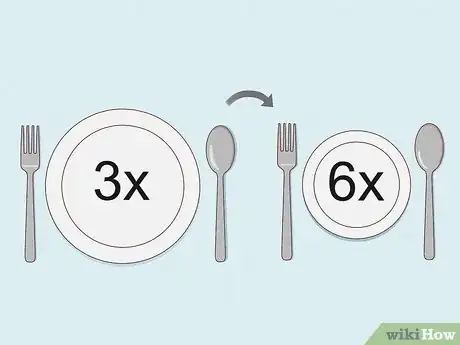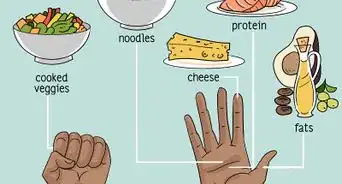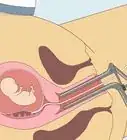This article was co-authored by Olivia Mitchell, RDN, IFNCP and by wikiHow staff writer, Jessica Gibson. Olivia Mitchell is an Integrative and Functional Nutrition Certified Practitioner (IFNCP™) and a Registered Dietitian Nutritionist (RDN) with a focus on women's hormones and fertility. Olivia has her virtual practice where she helps her clients dive deeper into often overlooked causes of infertility with a customized diet, lifestyle, and supplement changes. She is also the co-founder of the Natalwork and Lead Nutrition Coach with On The Goga. Olivia received her Bachelor’s degree in Nutrition Sciences from West Chester University of Pennsylvania and her RDN from The University of Houston.
There are 11 references cited in this article, which can be found at the bottom of the page.
wikiHow marks an article as reader-approved once it receives enough positive feedback. In this case, 100% of readers who voted found the article helpful, earning it our reader-approved status.
This article has been viewed 1,393,909 times.
Losing weight while you're pregnant is generally not advised by medical professionals — even overweight and obese women are almost always advised to gain weight during pregnancy. However, there are things you should do to prevent yourself from gaining unnecessary weight during your pregnancy. Here's what you should know.
Steps
Safety Precautions
-
1Do not try to diet while pregnant. You should never try to lose weight while pregnant unless your doctor specifically tells you otherwise. Do not start a weight-loss regimen after you find out that you are pregnant. It is actually recommended that all women gain weight during pregnancy.[1]
- Obese women should gain between 11 and 20 pounds (5 and 9 kg).
- Overweight women should gain between 15 and 25 pounds (7 and 11 kg).
- Normal-weight women should gain between 25 and 35 pounds (11 and 16 kg).
- Underweight women should gain between 28 and 40 pounds (13 and 18 kg).
- Dieting during pregnancy could deprive your baby of needed calories, vitamins, and minerals.
-
2Know when weight loss may occur. While weight loss is not recommended during pregnancy, it is fairly normal for many women to lose weight during their first trimester.[2]
- Many women experience bouts of nausea and vomiting commonly referred to as “morning sickness.” This nausea is strongest during the first trimester, and it might be difficult to keep food down or eat normal meals during this time. Minor weight loss may not be anything to worry about, especially if you are overweight since your baby can draw from the extra reserve of calories in your fat tissue.
Advertisement -
3Talk to your doctor or dietician. If you feel you have a legitimate concern about your weight, talk to your doctor or a pregnancy dietician about how to manage your weight in a way that is healthy for both you and your baby. Never begin a special diet before discussing it with a medical or pregnancy professional.[3]
- You should also talk to your doctor if you cannot keep any food down or lose a considerable amount of weight, even during the first trimester.
Staying Healthy
-
1Understand your caloric needs. Women who started at a normal weight before pregnancy need 340 to 450 extra calories per day during their second and third trimesters.[4]
- Normal-weight women should consume 1800 daily calories during the first trimester, 2,200 daily calories during the second trimester, and 2400 daily calories during the third trimester.[5]
- Eating more calories than recommended may lead to an unhealthy increase in weight.
- If you were underweight, overweight, or obese before pregnancy, discuss your caloric needs with your doctor. These needs vary from person to person. Even if there are rare circumstances surrounding your pregnancy that make weight loss a healthy option, you may still need to maintain or increase your caloric intake.
- You should also talk to your doctor about your caloric needs if you are pregnant with multiples. You will likely need even more calories if you are carrying more than one baby.
-
2Avoid empty calories and unhealthy foods. Empty calories will lead to unnecessary weight gain but will not provide your baby with any of the nutrients he or she needs. Avoiding empty calories is vital in maintaining a pregnancy weight that is healthy for you.[6]
- Avoid foods with added sugars and solid fats. The usual culprits include soft drinks, desserts, fried foods, rich dairy products like cheese or whole milk, and fatty cuts of meat.
- Opt for low-fat, fat-free, unsweetened, and no-added-sugar options when available.
- Also avoid caffeine, alcohol, raw seafood, and potential sources of bacteria.
-
3Take prenatal vitamins. Your body will have additional nutritional needs during pregnancy. Prenatal vitamins allow you to address these needs without having to ingest more calories than absolutely necessary.[7]
- Never rely on prenatal vitamins as a substitute for actual food, even if your doctor tells you that weight loss is acceptable for your circumstances. Supplements are absorbed best when taken with food, and vitamins obtained from food are generally easier for your body to access than those obtained through supplements.
- Folic acid is one of the most important prenatal vitamins you can take. It markedly minimizes the risk of neural tube defects.
- Iron, calcium, and omega-3 fatty acid supplements also help maintain your body functions while aiding your baby in his or her development.
- Avoid supplements that provide excess vitamin A, D, E, or K.
-
4Eat frequent, small meals. Eating multiple small meals throughout the day instead of three large ones is a tactic used by many dieters to maintain portion control, but it also benefits you as a pregnant woman.[8]
- Aversions to food, nausea, heartburn, and indigestion often cause the experience of eating a full-size meal to become unpleasant during pregnancy. Eating five to six small meals throughout the course of the day can make it easier and more comfortable to digest your food. This is especially true as your baby grows and begins to crowd your digestive organs.
-
5Maintain a healthy diet rich in pregnancy-aiding nutrients. Focus on foods that provide folate and make sure to get plenty of protein, healthy fat, carbohydrates, and fiber.[9]
- Foods rich in folate include orange juice, strawberries, spinach, broccoli, beans, and fortified breads and cereals.
- Start off with a well-rounded breakfast to make you feel better for the entire day.
- Opt for whole-grain carbohydrate sources rather than processed grains like white bread.
- High-fiber foods can help regulate weight and prevent digestive problems like constipation. Whole grains, vegetables, fruits, and beans are generally good sources of fiber.
- Make sure to include fruits and vegetables in your diet as often as possible.
- Opt for unsaturated "good" fats like olive oil, canola oil, and peanut oil.
-
6Eat healthy snacks. Snacks can be perfectly healthy during pregnancy, even if your doctor recommends a small amount of weight gain or weight loss. Choose healthy snacks rich in nutrition over-processed foods and desserts heavy in sugar or rich dairy fat.[10]
- Consider a banana smoothie or frozen all-fruit nonfat sorbet instead of ice cream and shakes.
- Munch on trail mix, nuts, and fruit in between meals.
- Instead of white crackers and fatty cheese, eat whole-grain crackers covered with a small amount of low-fat cheese.
- Hard-boiled eggs, whole-grain toast, and plain yogurt are other snack options worth considering.
- Instead of sugary drinks, go for low-sodium vegetable juice, sparkling water with a splash of fruit juice, or flavored skim or soy milk over ice.
-
7Do light exercise. Exercise is an important part of weight-loss diets outside of pregnancy and it also plays a significant role in achieving a healthy weight during pregnancy. Healthy pregnant women should get, at minimum, 2 hours and 30 minutes of moderate aerobic activity weekly.[11]
- Exercise also relieves pregnancy aches, improves sleep, regulates emotional health, and lowers the risk of complications. It may make losing weight after pregnancy easier, as well.
- Talk to your doctor before beginning an exercise regimen. Stop exercise immediately if vaginal bleeding occurs or if your water breaks prematurely.
- Good exercise options to choose from include low-impact activities like walking, swimming, dancing, and cycling.[12] In fact, walking is a fantastic way to exercise during any trimester.[13]
- As you get into the second trimester, create a specific exercise routine for yourself. This keeps your hormones balanced, which determines what your weight loss is going to look like. You could run, try HIIT training, or do squats and push-ups, as long as these exercises feel good to you.[14]
- Yoga is a fantastic option as you progress into the second and third trimester. It helps get your body limber and flexible as you prepare for labor and delivery.[15]
- Avoid activities where you can get struck in the abdomen, like kickboxing or basketball. You should also avoid activities during which you might fall, like horseback riding. Avoid scuba diving since it could cause gas bubbles to build up in your baby's blood.
Expert Q&A
-
QuestionHow can I start exercising when pregnant?
 Olivia Mitchell, RDN, IFNCPOlivia Mitchell is an Integrative and Functional Nutrition Certified Practitioner (IFNCP™) and a Registered Dietitian Nutritionist (RDN) with a focus on women's hormones and fertility. Olivia has her virtual practice where she helps her clients dive deeper into often overlooked causes of infertility with a customized diet, lifestyle, and supplement changes. She is also the co-founder of the Natalwork and Lead Nutrition Coach with On The Goga. Olivia received her Bachelor’s degree in Nutrition Sciences from West Chester University of Pennsylvania and her RDN from The University of Houston.
Olivia Mitchell, RDN, IFNCPOlivia Mitchell is an Integrative and Functional Nutrition Certified Practitioner (IFNCP™) and a Registered Dietitian Nutritionist (RDN) with a focus on women's hormones and fertility. Olivia has her virtual practice where she helps her clients dive deeper into often overlooked causes of infertility with a customized diet, lifestyle, and supplement changes. She is also the co-founder of the Natalwork and Lead Nutrition Coach with On The Goga. Olivia received her Bachelor’s degree in Nutrition Sciences from West Chester University of Pennsylvania and her RDN from The University of Houston.
Integrative & Functional Nutrition Certified Practitioner Walking is a fantastic choice during any trimester. Yoga is another great option, especially as you transition into the second and third trimester—it'll help you stay nice and flexible as you approach your due date.
Walking is a fantastic choice during any trimester. Yoga is another great option, especially as you transition into the second and third trimester—it'll help you stay nice and flexible as you approach your due date. -
QuestionHow can I get in shape while pregnant?
 Olivia Mitchell, RDN, IFNCPOlivia Mitchell is an Integrative and Functional Nutrition Certified Practitioner (IFNCP™) and a Registered Dietitian Nutritionist (RDN) with a focus on women's hormones and fertility. Olivia has her virtual practice where she helps her clients dive deeper into often overlooked causes of infertility with a customized diet, lifestyle, and supplement changes. She is also the co-founder of the Natalwork and Lead Nutrition Coach with On The Goga. Olivia received her Bachelor’s degree in Nutrition Sciences from West Chester University of Pennsylvania and her RDN from The University of Houston.
Olivia Mitchell, RDN, IFNCPOlivia Mitchell is an Integrative and Functional Nutrition Certified Practitioner (IFNCP™) and a Registered Dietitian Nutritionist (RDN) with a focus on women's hormones and fertility. Olivia has her virtual practice where she helps her clients dive deeper into often overlooked causes of infertility with a customized diet, lifestyle, and supplement changes. She is also the co-founder of the Natalwork and Lead Nutrition Coach with On The Goga. Olivia received her Bachelor’s degree in Nutrition Sciences from West Chester University of Pennsylvania and her RDN from The University of Houston.
Integrative & Functional Nutrition Certified Practitioner A specific, consistent exercise routine helps keep your hormones balanced, which ultimately decides what your weight gain will look like. If your body tolerates it well, you might try doing some HIIT training, or doing some squats and push-ups.
A specific, consistent exercise routine helps keep your hormones balanced, which ultimately decides what your weight gain will look like. If your body tolerates it well, you might try doing some HIIT training, or doing some squats and push-ups. -
QuestionCan you run while you're pregnant?
 Olivia Mitchell, RDN, IFNCPOlivia Mitchell is an Integrative and Functional Nutrition Certified Practitioner (IFNCP™) and a Registered Dietitian Nutritionist (RDN) with a focus on women's hormones and fertility. Olivia has her virtual practice where she helps her clients dive deeper into often overlooked causes of infertility with a customized diet, lifestyle, and supplement changes. She is also the co-founder of the Natalwork and Lead Nutrition Coach with On The Goga. Olivia received her Bachelor’s degree in Nutrition Sciences from West Chester University of Pennsylvania and her RDN from The University of Houston.
Olivia Mitchell, RDN, IFNCPOlivia Mitchell is an Integrative and Functional Nutrition Certified Practitioner (IFNCP™) and a Registered Dietitian Nutritionist (RDN) with a focus on women's hormones and fertility. Olivia has her virtual practice where she helps her clients dive deeper into often overlooked causes of infertility with a customized diet, lifestyle, and supplement changes. She is also the co-founder of the Natalwork and Lead Nutrition Coach with On The Goga. Olivia received her Bachelor’s degree in Nutrition Sciences from West Chester University of Pennsylvania and her RDN from The University of Houston.
Integrative & Functional Nutrition Certified Practitioner You can, but you might have more energy during your second trimester. If you're used to running every day, you can definitely continue to run while you're pregnant.
You can, but you might have more energy during your second trimester. If you're used to running every day, you can definitely continue to run while you're pregnant.
Warnings
- Never intentionally try to lose weight during pregnancy, especially not without your doctor's explicit recommendation.⧼thumbs_response⧽
References
- ↑ https://www.niddk.nih.gov/health-information/weight-management/healthy-eating-physical-activity-for-life/health-tips-for-pregnant-women
- ↑ https://newsnetwork.mayoclinic.org/discussion/mayo-clinic-q-and-a-morning-sickness-should-i-be-worried/
- ↑ https://www.mayoclinic.org/healthy-lifestyle/pregnancy-week-by-week/in-depth/pregnancy-weight-gain/art-20044360
- ↑ https://www.niddk.nih.gov/health-information/weight-management/healthy-eating-physical-activity-for-life/health-tips-for-pregnant-women
- ↑ https://medlineplus.gov/ency/patientinstructions/000584.htm
- ↑ https://kidshealth.org/en/parents/eating-pregnancy.html
- ↑ https://www.mayoclinic.org/healthy-lifestyle/pregnancy-week-by-week/in-depth/prenatal-vitamins/art-20046945
- ↑ https://www.ncbi.nlm.nih.gov/books/NBK279575/
- ↑ https://www.mayoclinic.org/healthy-lifestyle/pregnancy-week-by-week/in-depth/pregnancy-nutrition/art-20045082
- ↑ https://www.med.umich.edu/1libr/Nutrition/SnacksPregnency.pdf
- ↑ Patricia Ladis PT, CBBA. Licensed Physical Therapist. Expert Interview. 19 March 2021.
- ↑ Patricia Ladis PT, CBBA. Licensed Physical Therapist. Expert Interview. 19 March 2021.
- ↑ Olivia Mitchell, RDN, IFNCP. Integrative & Functional Nutrition Certified Practitioner. Expert Interview. 22 June 2021.
- ↑ Olivia Mitchell, RDN, IFNCP. Integrative & Functional Nutrition Certified Practitioner. Expert Interview. 22 June 2021.
- ↑ Olivia Mitchell, RDN, IFNCP. Integrative & Functional Nutrition Certified Practitioner. Expert Interview. 22 June 2021.
About This Article
While it’s perfectly normal and healthy to gain weight while you’re pregnant, you may be concerned about keeping your weight loss to a minimum. Every woman’s caloric needs during pregnancy are different, but in general, you should add an extra 300 calories a day to your normal diet during the second and third trimester. Avoid empty calories in unhealthy foods like chips, soda, and fried foods, and instead opt for healthy options like veggies, whole grains, and lean proteins. For tips on getting healthy exercise while you’re pregnant, read on!

